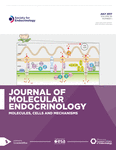Regulation of androgen action during establishment of pregnancy
- D Gibson, MRC Centre for Inflammation Research, The University of Edinburgh, Edinburgh, United Kingdom of Great Britain and Northern Ireland
- I Simitsidellis, MRC Centre for Inflammation Research, The University of Edinburgh, Edinburgh, United Kingdom of Great Britain and Northern Ireland
- P Saunders, MRC Centre for Inflammation Research, The University of Edinburgh, Edinburgh, United Kingdom of Great Britain and Northern Ireland
- Correspondence: Douglas Gibson, Email: d.a.gibson{at}ed.ac.uk
Abstract
During the establishment of pregnancy, the ovarian-derived hormones progesterone and oestradiol regulate remodelling of the endometrium to promote an environment that is able to support and maintain a successful pregnancy. Decidualisation is characterised by differentiation of endometrial stromal cells that secrete growth factors and cytokines that regulate vascular remodelling and immune cell influx. This differentiation process is critical for reproduction and inadequate decidualisation is implicated in the aetiology of pregnancy disorders such as foetal growth restriction and preeclampsia. In contrast to progesterone and oestradiol, the role of androgens in regulating endometrial function is poorly understood. Androgen receptors are expressed in the endometrium and androgens are reported to regulate both the transcriptome and secretome of endometrial stromal cells. In androgen target tissues, circulating precursors are activated to mediate local effects and recent studies report that steroid concentrations detected in endometrial tissue are distinct to those detected in the peripheral circulation. New evidence suggests that decidualisation results in dynamic changes in the expression of androgen biosynthetic enzymes highlighting a role for pre-receptor regulation of androgen action during the establishment of pregnancy. These results suggest such enzymes could be future therapeutic targets for the treatment of infertility associated with endometrial dysfunction. In conclusion, these data support the hypothesis that androgens play a beneficial role in regulating the establishment and maintenance of pregnancy. Future studies should be focussed on investigating the safety and efficacy of androgen supplementation with the potential for utilisation of novel therapeutics, such as SARMs, to improve reproductive outcomes in women.
- Received 6 February 2016
- Revision received 4 April 2016
- Accepted 11 April 2016
- Accepted Preprint first posted online on 11 April 2016











